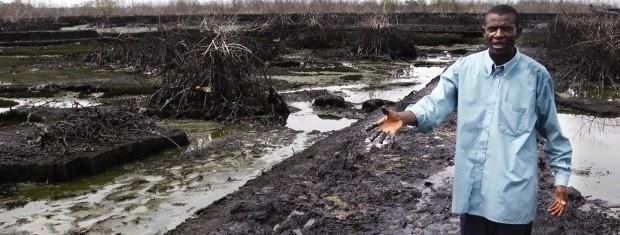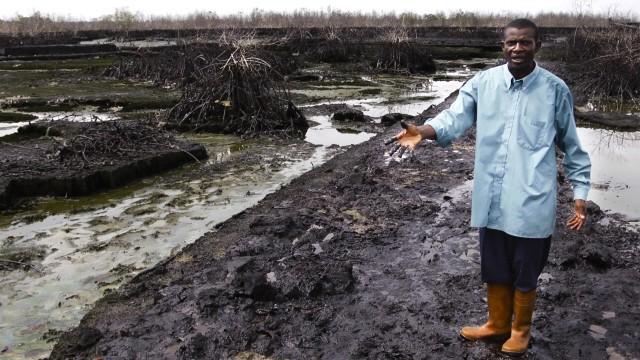Cleaning up oil-stained Ogoniland (aka Buhari’s chance to break the cycle of abuse in the Niger Delta)

Nigeria’s President Buhari is launching what would be the biggest oil clean-up exercise the world’s ever seen…if he’s really serious

Pastor Christian Lekoya Kpandei showing the damage done to his fish farm in Bodo, Nigeria, May 2011. Credit: Amnesty International.
Could 2016 be the year that a proper clean-up of the oil-stained creeks and fields of the Niger Delta finally gets underway?
That’s certainly the promise of the Nigerian government, with President Muhammadu Buhari expected to launch the process at a ceremony in Ogoniland today, 2 June.
The president has already announced that the clean-up will follow a plan outlined by the United Nations Environment Programme (UNEP), which in 2011 published the most detailed study to date of the spread and the scale of oil pollution in Ogoniland, as well as the impact it’s had on residents there.
UNEP’s researchers found that people had “lived with chronic oil pollution throughout their lives” and that pollution had contaminated the fields where they grow food, the water where they fish, and the wells from which they drink.
It is over 20 years since the writer and campaigner Ken Saro-Wiwa described his homeland as suffering from an “ecological disaster”. But UNEP’s findings revealed that, if anything, things have got worse, with new spills occurring every year and the oil operator Shell failing to properly clean them up.
The task that President Buhari has set his government is thus huge. According to UNEP, the environmental restoration of Ogoniland “could prove to be the World’s most wide-ranging and long term oil clean-up exercise ever undertaken”.
It could take 25-30 years to bring contaminated drinking water, land, creeks and important ecosystems such as mangroves “to full, productive health”. Furthermore, UNEP estimated that the first-five year period of the clean-up alone would require $1 billion, though the government has made it clear that it does not just want to address the problem in Ogoniland, but in other affected parts of the delta too.
History repeating?
There is no doubt that President Buhari’s commitment to this issue is welcome. However, in years of campaigning, we have seen similar promises in the past, with little actually changing on the ground.
For instance, in 1995, the year that Ken Saro-Wiwa was executed, Shell launched, with much fanfare, its own version the UNEP report, known as the Niger Delta Environment Survey. The company correctly identified that one of things holding the region back was the staggering lack of information and data relating to the pollution and its health impact.
Shell promised that the findings of this “independent” survey would be made publicly available and would be used by the government to “plan developments and minimise the impact on the environment”. But the survey, which Shell said cost $2 million and took two years to complete, turned out to be little more than a PR exercise. 20 years later, Shell has still not published it, despite promising to do so.
In 2007, the Nigerian government commissioned UNEP to conduct its own research, but progress has been extremely slow on that front too, even after experts uncovered health risks that required urgent action. In Ogale, for example, UNEP researchers found that water wells close to a pipeline operated by the Nigerian National Petroleum Corporation were contaminated with benzene, a known carcinogen, at levels over 900 times above the World Health Organisation guideline. In total, UNEP found hydrocarbon contamination in water taken from 28 wells in 10 communities adjacent to contaminated sites across Ogoniland.
In response to these findings, Shell funded the construction of a water pipeline. But this only carries treated water to the people of Ogale and does not reach all of the other areas with contaminated wells. Last year I visited one of these areas, Ebubu, which is right next to Ogale. Understandably, the people there were deeply frustrated that the pipeline does not extend to their community and are worried about that safety of the water that they still have to drink. “The most important thing for us is to have clean water that we can give to our new born babies,” said one woman.
In 2012, then-President Goodluck Jonathan set up the Hydrocarbon Pollution Restoration Project (HYPREP) to implement the recommendations made by UNEP. But how HYPREP’s officials spent their budget is matter of speculation. The only obvious evidence of their work is in the red warning signs now posted next to contaminated creeks and spill sites. When I visited HYPREP’s ghost-like offices in Port Harcourt last year, it was clear that the organisation existed only in name. Before being turned away by a bored-looking security guard, I caught a glimpse of dozens of vehicles gathering dust in an overgrown car park.
For President Buhari’s plans to have even the remotest hope of success therefore, he needs to make sure that the people of the Niger Delta trust what he is doing. They need to trust that the clean-up funds will actually go on cleaning up the region and are not stolen or handed out to politically-connected contractors.
Shell’s ultimate responsibility
If the region is to be genuinely cleaned up, Shell also needs to act. The company claims to have improved its response to spills in the wake of criticism by UNEP’s scientists. But last year, Amnesty International and the Centre for the Environment, Human Rights and Development, which is based in Port Harcourt, discovered that the company had made false claims about its clean-up of spills in four locations in Ogoniland.
In each of these places, the company said its contractors had remediated the damage caused by oil spills, yet the signs of ongoing contamination were still clearly visible. It was also evident that Shell was failing to prevent oil leaks from these areas spreading into neighbouring forests, fields and streams.
In response to our report, Shell, and the government regulator which had signed off on the clean-ups, said that the oil we saw must have come from unreported recent spills, probably caused by thieves or saboteurs. They provided no evidence for these claims, which are disputed by members of the communities living next to the sites.
Despite recent divestments, Shell remains the largest oil operator in Nigeria, and its pipelines still criss-cross Ogoniland and many other parts of the Niger Delta. Regardless of the government’s wider clean-up plan, Shell remains responsible under Nigerian law for the clean-up and remediation of oil spills from its facilities, whatever the cause. Shell should not be allowed to hide its failure to clean up scores of spills behind the company’s publicly stated commitment to support the Buhari plan.
Abandoned to the mercies of oil companies
Finally, considering the recent wave of pipeline attacks in the Niger Delta, it might be tempting for the government to decide to focus on security issues first and then deal with the environment later. This would be a short-sighted mistake. As President Buhari himself acknowledged earlier this year, the two issues are bound together.
“The devastation caused by oil spillage has destroyed many lives and livelihoods and is clearly one of the reasons why many people in that region lost faith in government and resorted to the many criminal activities we are seeing in the region,” he stated.
He is right. The Niger Delta has been effectively abandoned to the mercies of the oil companies for decades. Countless communities have seen their only source of subsistence destroyed by oil. The government has failed to hold the companies to account, and it has often seemed that its only presence in the Delta are the troops sent in to protect oil installations.
President Buhari has the chance to break the cycle of abuse in the Niger Delta, if he follows through on this commitment to clean it up. But to do this, he has to ensure that the vested interests of the oil industry do not overshadow the real interests of the people of the Delta.
Mark Dummett is a Business and Human Rights Researcher at Amnesty International






Although I know Nigeria is far along in this regard, there needs to be some investment in civil society (including journalists) to learn the skills and methods to make these issues known to the population. The good and the bad. I enjoyed Celeste Hick’s book on the new African oil producers in this regard.
Supporting civil society is no silver bullet (look at the tar sands in Canada) but it is clear that at some point it is necessary – governments everywhere care more about profits (legal or illegal) over people and the environment.
CLEAN-UP OF OIL-STAINED OGONILAND: THE TRUTH MUST BE TOLD
Truth must be told and by someone. We, the people of Ebubu appreciate your deep concern for our plights, and efforts of Amnesty International Team led by Mark Dummett , that visited Ebubu last year to see the environmentally devastating condition in which we live and to ensure that our right to clean water and sanitation is respected by Shell and the Nigerian Government.
When you visited Ebubu last year our hopes were raised and our expectations rekindled. You spent some days with us and visited numerous polluted sites (some as old as over 40 years), witnessed oil polluted water from wells that we have to live on throughout our lives, which were well captured in your analysis. It is unfortunate that Shell is still being economical with the truth by asserting that the “oil you saw must have come from unreported recent spills probably caused by thieves or saboteurs”. These claims are outrageous. No wonder, Shell has the highest number of litigations globally with a record breaking human rights abuse and an overwhelming manipulative, exploitative and divide and rule power at its disposal to oppress and frustrate its host communities.
When SPDC and Rivers State Government started Emergency Water supply to Ebubu following the UNEP Report on Ogoni our joy knows no bound. Unfortunately this was short-lived. The efforts to convince Shell and Rivers State Government to continue the Emergency Water Supply to Ebubu which was surprisingly stopped in 2013 following the commissioning of the Aleto-Eleme Water Scheme yielded no positive result. As you witnessed during your fact finding tour, and well-known to SPDC and Rivers State Government that the orchestrated Eleme Water Scheme only carry water to Ogale and does not reach Ebubu and other areas with contaminated wells like Ebubu.
Nevertheless, we are not downcast. We know Shell, out tenant. The Amnesty International’s concern about the safety of the water that we have to drink in Ebubu is understandable. Only Shell and the Federal Government of Nigerian have no value for human lives, especially the lives of the people of Niger Delta. Perhaps, they want to kill all of us so as to have free, uninterrupted access to our oil and gas. God save us!
Today, they are carrying a Masquerade tagged “Ogoni Clean-up” and dancing in our town square; perhaps because Masquerade is part of our culture. But, you said it all. This is not new. Like two agboros fighting at the Motor Park, their aim is to steal from the passersby who attempts to make peace between them. The Ogonis know Shell well – they are after the oil not clean-up. The clean-up of the oil-stained creeks and fields of Eleme and Ogoni is K-Legged and appears politically-driven.
As we are all aware, the fight has just started. SPDC has accused the Federal Government of Nigeria of insincerity and lack of commitment; yet pipes are being shipped into Ogoniland, what for? The 2nd June, 2016 flag-off of the Ogoni Clean-up was a big jamboree. The intents are well-known based on the UNEP report on Ogoniland, but the actions and strategies as well as control of the related resources are questionable; and may eventually generate further conflicts. If only we know that it will take 25 – 30 years to return the Ogoni environments to normalcy.
The cycle of abuse in the Niger Delta can be likening to a solid rock that requires strong WILL and resources to break. It is doubtful if we have these values now. The ploy to use the Ogoni Clean-up to gain political advantage in Ogoni have been uncovered and the people are out to resist such manoeuvring.
Our concern and appeal remains that Shell and Rivers State Government continue the Emergency Water Supply to Ebubu as part of the Clean-up exercise until a more permanent safe source of water is provided to save the people. Water is not available in Ebubu! Water is not physically accessible in Ebubu! Water is not affordable in Ebubu! The people are dying in their numbers from water born diseases.
It’s posible, but just if many people, especially journalists, will share information and take it under control and lighting the situation. So, go ahead!